#pre-travel covid test
Text
Book Your Travel-Ready PCR Test at Global Travel Clinics
Global Travel Clinics PCR testing services offer accurate tests that meet international travel requirements. Our clinics are located all over and our fast result services from professional personnel are guaranteed. With an easy booking process, you can quickly schedule your test online or by phone. Organize your travel without stress and ensure that you get your PCR test from Global Travel Clinics.
#travel covid testing#rapid testing#covid 19 test for travel#pre-travel covid test#private covid testing#travel vaccinations#pcr test#covid pcr test for travel#rapid travel test#healthcare
0 notes
Text
Olympics volunteers resign over lack of Covid-19 precautions
Earlier this month, a group of Olympic volunteers demanded Covid-19 precautions at the 2024 Paris Olympics, stating they would resign if precautions weren’t implemented.
“Covid-19 pandemic threat denial is not an antidote to contamination,” the volunteers wrote in a press release. “If no steps are taken, we will collectively resign from our assignments, and will not show up on the Olympic and Paralympic sites we have been staffed.”
Since their statement was issued on July 15, the group has not received a response from the 2024 Olympic organizers, a member of the group told The Sick Times in a phone interview. The volunteer, Thomas, who wished to omit his last name, said the group had around one hundred members, some of whom have already resigned.
More than 10,000 athletes arrived this month in Paris and a handful had already tested positive for Covid-19 prior to the games’ start on July 26, including five members of the women’s Australian water polo team. Around 15 million people are predicted to travel to Paris, including 2 million international travelers, at a time when the country is seeing an increase in Covid-19 cases, according to World Health Organization spokesperson Margaret Harris.
Still, organizers and teams continue to downplay the spread of the disease. Australian team chief Anna Meares told Reuters: “I need to emphasize that we are treating Covid no differently to other bugs like the flu.”
Covid-19, however, is far more deadly than the flu and can cause Long Covid, a multi-systemic disease impacting millions around the world that does not have any approved treatments.
#covid#mask up#pandemic#covid 19#coronavirus#wear a mask#sars cov 2#still coviding#public health#wear a respirator#Paris#paris 2024#paris olympics#paris olympics 2024#2024 olympics#olympics#olympic games#olympics 2024#the olympics
61 notes
·
View notes
Text
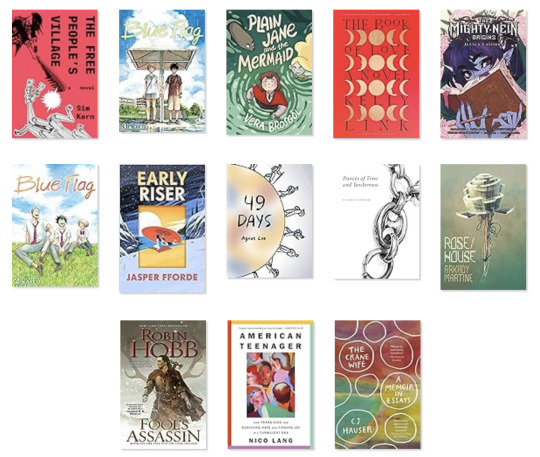
May Reading and Reviews by Maia Kobabe
I post my reviews throughout the month on Storygraph and Goodreads, and do roundups here and on patreon. Reviews below the cut.
The Crane Wife: A Memoir in Essays by CJ Hauser
This essay collection focuses on human relationships, many of them romantic, but also with grandparents, parents, sisters, best friends, COVID-isolation pods, and with the children of romantic partners from previous relationships. The title essay interweaves the experience of a broken engagement with a scientific expedition to study the dwindling population of whooping cranes in the Gulf Coast of Texas to devastating effect. Another experience, covering the DARPA Robotics Challenge trails, in which teams test out potential robotic first responders, speaks to the author's own desire to both save others and be saved by a string of problematic men. The author dated a lot of men and a few women in their twenties and processes them through the lens of media (the film The Philadelphia Story, the TV show The X-Files,the novels Don Quixote, Rebecca, We Have Always Lived in the Castle) and the perspective gained with time. I really loved this whole collection, but the piece that keeps rolling around in my mind is "The Fox Farm", about trying to recreate an archetype of a child's fantasy house (full of animals, friends, gardens, infinite rooms) in real life as an adult. I left this book wanting to know more- when did the author start using nonbinary pronouns? Have they resolved their feelings about their tits? Is that guest room in their big upstate New York house still available for visiting artists, and if so, how do I apply for the position of resident writer/new friend?
American Teenager: How Trans Kids are Surviving Hate and Finding Joy in a Turbulent Era by Nico Lang
Queer journalist and author Nico Lang traveled around the US to meet 11 families of trans teens and see how anti-trans legislation is impacting their daily lives. Each family has different circumstances; one teen fears his top surgery will be indefinitely delayed, while another had surgery already and has joined the boys swim team at his high school. Some teens are moved to become activists while others want to just live their normal, low-profile lives. With humor and compassion, Lang shows trans teenagers as they really are: kids trying their best, day by day, to grow into their truest selves and fullest potential. The various chapters are by turns deep, silly, introspective, sweet, and smart, just like teens themselves. I was able to read an advanced copy of this book- pre-order it now, or look for it on shelves in October 2024!
Fool’s Assassin by Robin Hobb read by Elliot Hill
NO ONE IS DOING IT LIKE ROBIN HOBB. NO ONE! After a disappointing journey up the Rain Wilds River, baby we are BACK! And by back, I mean, back in a first person POV and back with FitzChivalry, one of my literal favorite fictional characters ever. This is the 7th book about his life, and the 14th overall book in this series, so I won't be summarizing it. Let's just say that Fitz found his happy ending (minus a few key soulmates) and then his life kept going. More problems, more politics, more magic, maybe stranger than ever before. A new character introduced in this series swept in and stole my heart. I can't wait to dive into the next book very soon!
Rose/House by Arkady Martine read by Raquel Beattie
A brief murder mystery set in an fully conscious AI house in the southwest desert. This story feels in conversation with Ray Bradbury's story The Veldt and has many elements I enjoy, but a somewhat unresolved and slightly unsatisfying ending. I'm honestly still simmering on my thoughts, but looking forward to discussing this in book club soon! Edit post book club: a discussion helped me clarify what I thought was working in this book (tone, setting, themes) and what was not working (too many red herrings for such a short book, and an ending twist that seemed to undercut the book's main premise). I still think it's worth a read for Arkady Marine fans, but it is not as strong as her full length books.
Dances of Time and Tenderness by Julian Carter
In 2016 Julian Carter, a queer author and long-time participant in San Francisco's dungeon kink scene, received an invitation to be part of an archival matchmaking project. The project paired artists, activists, and scholars with specific issues of OUT/LOOK: The National Lesbian and Gay Quarterly. The assignment was to use the issue as a jumping off point to think about queer history and make something "new and provocative." Carter's assigned issue was from Winter 1991, the year the CDC announced 1 million American were HIV positive and AIDS was the 3rd leading cause of death in people aged 25-44 years. One of the many who died in 1991 due to AIDS related complications was Lou Sullivan, one of the first trans men to publicly identify as gay. From this starting point, this book traces paths of queer lineage, both proclaimed and obscured, traveling through history, memory, and poetry. Carter is linked, through friendship or scholarship, to Susan Stryker, pioneer of transgender history, to Zach Ozma, who edited Lou Sullivan's diaries for publication, and to Lou himself. Casting a transgender eye back on a queer history divided sharply into gay and lesbian, Carter allows himself to claim as ancestors sailors, skeletons, writers, lovers, and reaches forward in time towards students, readers, and artists. Including me. I was fortunate enough to be gifted an early copy by the author, and read it back in February back in one delicious rush. I already want to read it again, and more slowly, this time underlining and annotating it. This is a book to savor, but is easy to devour instead. It's sensual and surprising, formally precise, and made me want to dig around in a mess of queer historical papers and also contribute my own to the pile. It's out on June 4, 2024; give it a pre-order or look for it on shelves soon!
49 Days by Agnes Lee
Kit, a young Korean American woman, wakes up on a beach with a map and a watch telling her she's already late. For days, she clambers over rocks and up trails, reaching for an undefined goal. Slowly, the book begins to flash back to Kit's childhood and family, the people she loved and left behind after her accidental death. In Buddhist tradition a soul travels for 49 days before rebirth, and this book follows one version of that path, the grief and slow healing that follow a loss. Drawn in a very simple yet evocative style, the spare ink lines and limited color fill this journey with meaning.
Early Riser by Jasper Fforde read by Thomas Hunt
What a bizarre and delightful novel. It's set in an alternate history in which ice-age level cold spells cause the majority of humans to hibernate every winter, which has ripple effects on the development of technology, societal rules, culture, and family structures. Charlie Worthing was born in a "pool" in the independent nation of Wales, or a group home in which nuns dedicated to reproduction birth and raise dozens of children, in returns for credits from those who can't or don't want to have their own kids. Charlie has very few job prospects, especially ones that will give him access to morphanox, a drug which helps most people survive their months-long winter sleeps. The drug also turns about 1 in 3000 into a brain-dead zombie, but this risk is considered better odds than sleeping without it. So Charlie volunteers for the Winter Consuls, the law-keepers and problem-solvers who stay up all winter to safe guard the majority. There he has to face the three well documented dangers of winter- Vacants (zombies), Villains (the British) and Winter Volk (fairies, whose reality is debated), as well as rumors of a viral dream. The humor in this book is a close cousin to Terry Pratchett's work, in which absurdity and invention mask some pretty biting social commentary and anti-capitalist motives. I did think some of the twists at the end didn't quite pay off, however, I had such a good time with the ride this book took me on that I'd still recommend it.
Blue Flag vol 2 by Kaito
This vol has already taken a kind of melancholy, bittersweet narrative tone which might put me off the series. I still really like the characters and overall think the writing is very effective, out I wish the humor and sweetness of book 1 would last farther into the series!
Critical Role: The Mighty Nein Origins: Jester Lavorre by Sam Maggs, Laura Bailey, Matthew Mercer, Hunter Severn Bonyun, Cathy Le, Ariana Maher
Short and sweet, this prequel comic shows Jester's first meeting with The Traveler, the prank that caused her need to flee from Nicodranas, and a window into Jester's relationship with her mother. It's a slight story but I loved the artwork, especially the outfits and the beautiful city views.
The Book of Love by Kelly Link
Kelly Link, one of my favorite short story authors, debuted a novel 650 pages long. I bought this the day of release but it took me a few months to actually crack it open. I'd seen it described as slow, but I think I'd say leisurely. It opens with an intriguing premise- four teenagers come back from the dead, not knowing how they died or why they were brought back 11 months later- and have to solve a magical problem if they want to keep living. But the book is less a mystery than a close examination of the teens lives in a small New England town in December. The teens include Danial, oldest of many step-siblings, who rejects his new magical powers and just wants to live a small and ordinary life. There's Mo, who lost his parents young, and was being raised by his grandmother, a famous Black romance novelist- who herself died during the 11 months he spent in an underworld. There's Laura, a musically ambitious teen, who comes back to her single mom and sister Susannah, who seems somehow entangled with the magical ritual that killed and might save her friends. And then there's a fourth person who none of the others know, who snuck out of death on their coat tails and has no name and few memories. The book rotates POVs every chapter, with more than 15 different POVs, some of whom only appear once in the whole volume. I love Link's writing style so this worked for me, but I can see how this choice to linger over details not directly related to the plot might not work for some readers. I really enjoyed this but it did take me 3 weeks to read it and I suggest other readers pick it up when ready for a slow burn of a book.
Plain Jane and the Mermaid by Vera Brosgol
This original fairytale opens with teenage Jane mourning the recent death of her parents, after she already lost her younger brother to the sea as a child. Because there's no male heir, Jane's horrible cousin will be kicking her out of the house in a week. The only option she can see is marrying within the week so that she can access her dowry. So Jane walks down to the fishing village below her manor and proposes to a beautiful but shallow fisherman's son. He accepts- then is immediately lured under the waves by a mermaid. Jane runs into the town asking for help but only an old woman with witchy vibes is willing to aid her. The crone gives Jane a potion so she can breathe underwater, a stone which will allow her to walk on the bottom of the ocean, and a shawl to keep her warm in the depths. So armed, Jane walks into the sea after the boy who feels like her only hope. Under the waves she encounters allies and enemies, learns the true power of her own will, and realizes she might have more choices than she's realized.
Blue Flag vol 3 by Kaito
Well, I started another book because the last one ended on a massive cliff hanger, but I think I'm setting the series down after this one. I still think it's very well written, but the main character has such low self-esteem that he shouts at other characters that he sucks, he's a jerk, he doesn't deserve their friendship and they should leave him alone. I bet the arc of this series will be building this character up to where he believes he deserves their love and friendship, but I just don't feel like dwelling in this character's self-pity at the moment. I would have eaten this shit up as a teen though! Especially with the queer characters.
The Free People’s Village by Sim Kern
Set in an alternate timeline in which Al Gore won the 2000 election and declared the War on Climate Change instead of the War on Terror, this novel is an interesting mix of hopeful and dystopian elements. The main character is Maddie Ryan, a white high school English teacher working in a primarily Black neighborhood in Houston, TX. The novel is Maddie's written account of a tumultuous year in which the grungy music warehouse where her punk band practices and performs is threatened by a proposed high way and oil line which will rip up not only their art space but also a historically Black neighborhood. Maddie starts attending activist meetings which quickly morph into a full blown protest encampment surrounding the warehouse. Dubbed the Free People Village, this protest movement goes viral and is met with the exact same kind of violent police response as the current student encampments protesting for Palestine on college campuses. Woven through this depressingly accurate political forecast are multiple queer love stories, interracial friendships, a 101 crash course in anarchist philosophy and bracing look at what long-term activism takes. Folks with more of an organizing or activist background than I might find some of this book a bit basic; but I was completely drawn in by the relationships and conflicts of Maddie, Red, Gestas, Angel, and Shayna. This book feels almost painfully timely, and I hope a lot of people read it and gain both courage and perspective.
27 notes
·
View notes
Text
An introduction to VR multiple units, part 5: Sm6
The Sm6 Allegro. When I started this series about our multiple units, I first thought I would cover the Sm6 in the "operated for others" -series, then thought I would leave it out altogether... but events overtook my plans and now I'm introducing them as VR's own multiple units, although they are not yet in operation as VR trains.

An Sm6 unit on the Kerava-Lahti line, currently the only bit of high-speed rail in Finland, 2011. Teemu Peltonen, Vaunut.org.
Since the 1990s, two daily return trains had been operated between Helsinki and Saint Petersburg, Russia: the Sibelius, which used VR carriages, and the Repin, which used RŽD carriages. In 2006, the two rail operators decided to replace the locomotive-hauled trains, which took five hours to make the trip, with jointly-owned high-speed trains. For this purpose, a new jointly-owned subsidiary Karelian Trains was established.

Two Sm6's during pre-service entry test runs at Vainikkala, the border station between Finland and Russia, with the locomotive-hauled St. Petersburg train Sibelius on the right. Lari Nylund, Vaunut.org.
After a round of tenders, Karelian Trains opted for the Pendolino design (already used by VR in the form of the Sm3) from Alstom in 2007, with four units to be delivered in 2010 (there was also an option for two additional units, which was never taken up). Although the exterior design of the new Sm6 units was almost identical to the Sm3, in terms of technology they feature numerous improvements compared to the older class, and were outfitted to operate both on the Russian and Finnish electric systems. Due to the small difference in gauge between the two countries (Russia uses 1520 mm but Finland 1524 mm) the trains were given near-unique gauge of 1522 mm.

Interior of the Sm6's first-class carriage as delivered. Otto Karikoski, Wikimedia Commons.
Branded Allegro, the new Sm6 units begun operations in December 2010, cutting the travel time between Helsinki and St. Petersburg to 3½ hours. In addition to services offered on Sm3 units, the Sm6 has (or perhaps more accurately had) a space for the border patrol to use, as passport control was done en-route on the train, and a kid's playroom. The original grey-dominated interiors were replaced by new, more colourful blue designs in 2018-2019.
The new interiors were not in use for long before the Covid-19 pandemic caused for passenger train services between Finland and Russia to be suspended in March 2020. The Allegro services were restored in December 2021 (the Helsinki-Moscow sleeper train Tolstoy, however, was not), and ran for less than four months until closed again in March 2022 after Russia's invasion of Ukraine. (VR subsequently stopped freight traffic to Russia too - other Finnish rail operators continue to serve freight to and from Russia, however).

Second-class carriage in the post-2019 look. VR.
After March 2022, the four Sm6 units languished at VR's Ilmala depot in Helsinki, without maintenance as RŽD refused to make any payments for their share in Karelian Trains (which, although jointly Finnish-Russian owned, was registered in Finland). In March 2023, when Finnish prime minister Sanna Marin visited Kiev, Ukrainian Railroads requested the Sm6 units be handed over to them, but nothing ever came of this. Instead, in December 2023, when Karelian Trains was on the brink of bankruptcy due to RŽD not paying their share of the company's bills, VR bought out Karelian Trains and took over the Sm6 units.
The trains will be given a thorough technical refit, which will include removal of the systems to operate with Russian electrification, and will enter services on routes within Finland in 2025. How they will be branded is unknown, though a VR representative said in an interview they will not be called Allegro. Presumably this will make the Sm6 the first VR rolling stock class to be fully painted in the new livery.
43 notes
·
View notes
Text
I was supposed to leave for my first work trip ever today. Instead I tested positive for COVID. Everyone keeps telling me they’re sorry given how excited I was but I feel so miserable. I got info about a close contact being positive yesterday night but it was too late to get tests already. (And I used my last test the day before as part of my pre-travel procedure).
I woke up this morning and knew even before I took the test. If it wasn’t COVID it was something else and I was apprehensive about going into a foreign country feeling less than perfect. It was almost a relief to get the positive and know that things were out of my hands.
#personal#covid 19#I have more feelings but they’re tag level feelings.#like I downplayed my symptoms earlier this week so of course people are focusing on the#fact I can’t go on the trip I’ve been excited about for literal months#I want sympathy but I’m getting it for the wrong reasons#also if I admit why I want sympathy aka I feel like shit I admit that I probably should have been teleworking this week#I put others at risk so I don’t feel like I deserve sympathy
6 notes
·
View notes
Text
cruisequarries PART TWO
PART ONE
What did we get up to yesterday? 2018? Okay. I will put everything behind a spoiler cut again (there are more pictures/a video today).
Actually, let's rewind just a little, for some Fallout premiere pictures just because.
Paris, July 12th:


London, July 13th:

Seoul, July 16th (according to the designer's website, the hanbok Heather is wearing was designed as a wedding dress, mmhmm)...

I love this picture because they're making those faces at Chris.
Here's the bit of Tom making Heather cry in Tokyo:
I highly recommend listening to Tom & Chris commentary track on Fallout, which starts with McQ introducing himself as the writer/director and then Tom introducing himself - as McQ's friend.
After the Fallout press tour wraps up, work starts in earnest on Top Gun: Maverick, which Tom and McQ have been discussing - idly, on McQ's part - for years now. "Our relationship is one long conversation about movies," indeed.
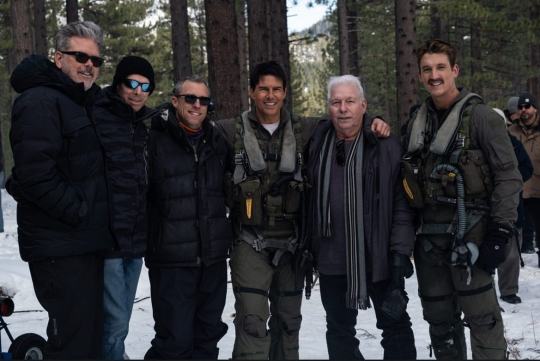
While TGM is filming, pre-production is also happening on MI:DR, which McQ has signed on to direct. (These two are usually juggling at least two projects at a time, and really it's probably more like five projects at a time.)
In January of 2019, they're all back in LA so Tom and McQ can pick up some awards.

The McQuarries also go to a premiere and look fantastic (I love McQ's suit):

Tom and McQ go to Ukraine to scout Dead Reckoning locations later in 2019, meet President Zelenskyy, and McQ gets to put his arm around Tom for once instead of their usual other way around.

OH NO I ALMOST FORGOT - at the end of 2019, Tom took the whole McQ clan with him to Las Vegas to see Lady Gaga and ask her to write the TGM song. [cries in 'that's his family']
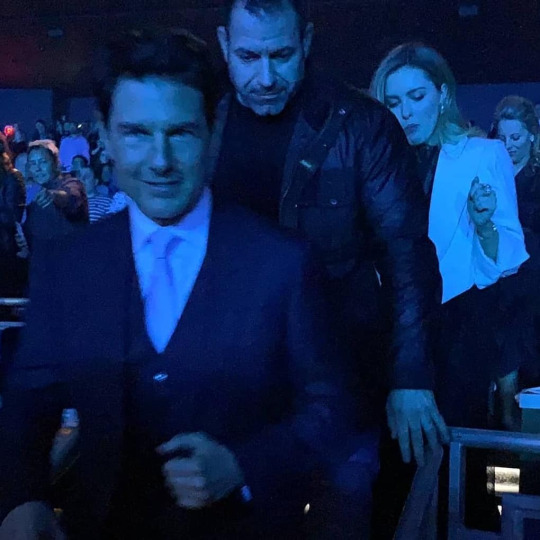
Production ramps up on DR - and then unfortunately, as we all know, COVID. Most of the cast and crew were in Venice when everything shut down, but Tom hadn't arrived yet.
Production resumes in Rome in October (their production struggles/trying to keep everyone employed/Tom rightfully yelling at people to follow protocols because a lot of jobs depend on them is all well documented), and then moves to Venice. Heather and the dogs are also part of this traveling band.
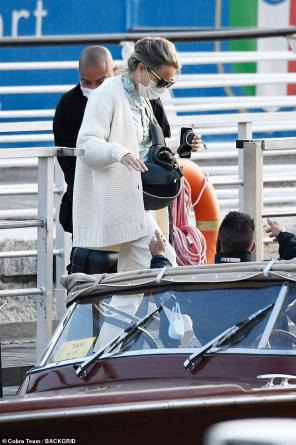
This isn't six feet apart, dudes...

Production breaks for the holidays, and resumes in Abi Dhabi for the airport/desert sequences, and also one of my favorite pictures of Tom and Heather, just for her expression.
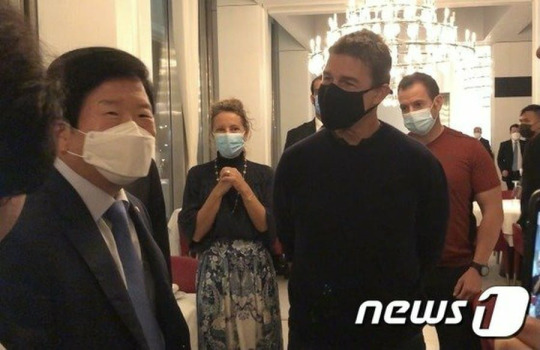
Train sequence filming in Yorkshire in April of 2021, that's Heather in the blue coat:
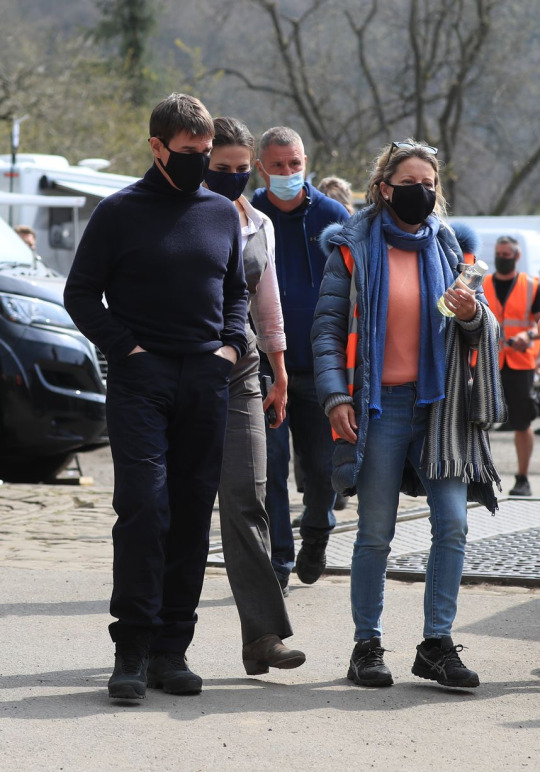
DR production then breaks for a bit over the summer so Tom can take all his friends to Wimbledon, go to several car things, and make McQ watch football (the soccer version).
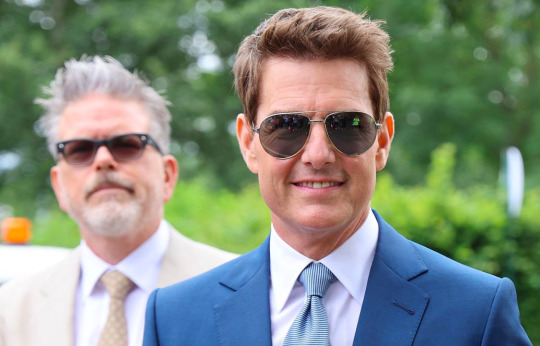
DR filming resumes in the fall/winter. Heather goes with to South Africa and they rent out what is basically an adults-only hotel (and save it from having to close!), for part of their stay. I love this picture because Gypsy looks so long-suffering:
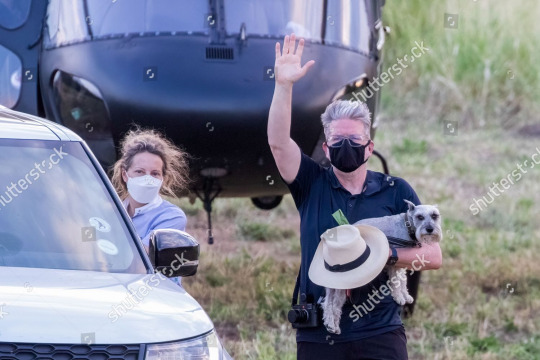
OKAY IT'S 2022 NOW, time for the Top Gun: Maverick premiere tour to start - finally! (Do any of these people SLEEP? No. I think it's well-documented that Tom Cruise does not sleep, which is part of what makes him Tom Cruise, but also this means he calls McQ at two in the morning to talk about movies. There's a podcast somewhere where McQ says he thinks Tom might sleep "between the 2:05 email and the 2:40 email", or something along those lines.)
(After getting back from South Africa, there was a bunch of test screening stuff for TGM, which is why there are those parking garage pictures. Wouldn't the movie be done, you'd think, since it was supposed to be out in 2020? COVID gave them a reason to tinker with it even more.)
The San Diego premiere on the USS MIdway (all the McQs were there, but there aren't any good pictures):

Then Tom went to Mexico, and McQ went home to London for a few days before Tom returned, and they went to the Royal Windsor horse show together.

THEN EVERYONE WENT TO CANNES. Sorry I have just a shitty screencap with a watermark here but alas tumblr only lets you put one video per post. Tom and McQ stopped to get their picture taken en route to the actual photocall and Tom made Heather come back and be in the pictures with them. There is video here.

Cannes, of course, was amazing. I have garbage homemade gifs but they're too big for tumblr (also they're garbage) but all the Cannes red carpet footage is available on YouTube, here and here. (Worth it for Heather, tbh.)

They went straight from Cannes - on Tom's helicopter - back to London for the Royal premiere. Where the McQuarries looked amazing and McQ wore his McQ shoes.

And the after party, because heaven forbid they not all ride in the same car:

And then the McQuarries got a slight break, while Tom went to do more TGM press. But he was back in London by the end of June, and they went on what can only be described as a string of dates.
First, they went to the Rolling Stones concert at Hyde Park.

McQ was on Tom's other side, but he's only visible in video (the Daily Mail might be garbage but they do come through with the media).
Then Tom and Heather went to The Eagles show at Hyde Park:

And they all went to see Adele - also at Hyde Park. (The woman in the pink sweater is Tom's CAA agent Maha Dakhil Jackson - I found the picture where you can see Heather over Tom's shoulder.)

Then for Tom's birthday, they went to the F1 British Grand Prix (with some other TGM folks, but they aren't three steps behind Tom like the McQuarries are).

Oh no, we're not done.
Tom takes Heather to Wimbledon, where she holds his sunglasses (not visible in this picture).

McQ did not go with, as he was recording a Light the Fuse podcast - which he surprise-dialled in a bunch of DR folks - and his final surprise was Tom. Who was still at Wimbledon with Heather. McQ calls Heather to get Tom, and Heather plays dumb and is like, "oh I don't know where he is, did you try calling him?" and Chris says he already told the podcast guys that they were together. So Tom does his segment from the car he's in with Heather, and his part is only supposed to be like ten minutes but he talks for about forty-five and this includes telling the world they basically all live together.
Then they went out to dinner!

And the next day they all went to Wimbledon with Maha and her husband.

I'm stopping here because this is already SO LONG and 2023 is going to be wild just by itself!
PART THREE
41 notes
·
View notes
Note
you post about library stuff, and I wanted to ask if you had an MLIS, and if so, how did you go about getting it? No pressure of course!
I am always down to talk about library school, no worries! 🧡🧡

I think I do have a couple posts in my library posting tab that also talk about my MLS process, so they may cover details I forget here, but details to know are:
I already worked at a library at the time that I applied to an MLIS program
Therefore I had a lot of help from other librarians, library assistants, administrative persons, and friends along the way
There were several other prospective students in my system that applied simultaneously, so we all could pool information so that we didn't all have to retread the same research holes simultaneously
I applied at the height of covid.
Several people in my workplace had already told me that online was the way to go if I was going to get a degree; better scheduling possibilities, more choice of programs, and more opportunities to apply; otherwise I would have had to go to the state school. It would have been fine. But traveling in person is a pain.
I did research on schools; what the price was per credit hour, how long it took to graduate, criteria to graduate, whether it was synchronous or asynchronous, or other things I might want to know during the application process. When picking a school, make sure it is ALA accredited if you are in the united states! They are the only schools! Do not pick a graduate degree in librarianship if ALA has not given it their Okay!
So I used their searchable database for an online, asynchronous, relatively cheap program. When I found one I liked, I went to look online specifically to see if it was an online program PRE-Covid. I did not want amateurs trying to work out zoom for the first time. I wanted a good program that already knew what it was doing.
So I found a program I liked, and double checked to see what I needed to apply. Normally it was three recommendation letters; due to covid, they only wanted one. Great! Begged one off a former professor. Normally I would have needed to take the GRE, but it was covid so it was waived, and I had a GPA high enough that the program would have waived the need for a GRE test score anyway. Score!! As someone who tests horribly on cumulative stuff, that was a huge relief.
I applied! I got in! I crammed as many classes in as I could simultaneously, since I was working part time and I needed to save money. I could have taken a maximum of six years to finish a degree, but every semester of tuition + sundry is a flat fee, So I saved my money by finishing as quickly as possible. (And, to be fair...nine credits a semester is easy. I used to do eighteen a semester in college. If you have ever taken an online course in your life, it's not that much harder in library school, especially when it's asynchronous.) I'd saved up money from a terrible former job where I couldn't see any friends or go anywhere to see anyone or take time to myself or even eat out, so I'd had money saved up I could use for my degree. 😬 I think in total it was somewhere between... $20,000 and $26,000. Semesters fluctuated between 4,000 and $6,000 depending on the classes I took. I never did winters and I never did summers, since the amount of classwork I could have done during those sessions wouldn't have made the flat fee worth it.
And then they were all keen to have me work on a practicum during my job, which was full time at that point, so I was working eleven hours a day in order to fulfill my degree requirements between my full time job and my part time job...it was super easy to arrange, since I just had to basically walk over to a former library I used to work and and be like "want me back here for free?" and they were like "is that illegal?" and I was like "apparently not", which is the benefit of networking, but our collective HR department had a conundrum of legal matters on their ends haha. And that's when I wrote Blister Pack out of sheer stress! 😊🧡🧡
And then I GRADUATED! Which just felt like Tuesday, since it was. I got my degree in the mail, my job made me pay a different entity $70 to make sure I was a "certified" librarian in this lovely state, and now I work the exact same job I did in grad school, but with slightly more pay.
Things I learned whilst pursing my degree:
Make out with a database. Seriously. Databases are 90% of your job now. The rest is on-the-floor maintenance, problem solving, and local politics. Learn to use limiters and Boolean goods and keywords and everything else, because you will need it.
The people who struggle the most are the former teachers and other alternate-profession professionals looking for a change in careers. The people who do the best are people who work in a library. If you have not worked in a library, volunteer at your local library. The concepts, lingo, and jargon will make so much more sense when you're exposed to them naturally.
Speaking of; network, network, network. Ask local librarians for help sooner rather than later, because eventually you are going to have to interview them or ask for their help or something. Know them now. Ask them your homework questions. Every librarian wants to talk shop. Let them.
Sometimes your books are cheap on Thriftbooks and Alibris and sometimes they are cheap because you find the PDF online for $0.00 and it feels morally wrong to use it for class but no it isn't. It's just illegal. But not even for you; it's only illegal for the site for hosting it. So...consider downloading your texts, lest they be $80 each.
OH but Worldcat does a price comparison on the side of every book entry so that you can see which site has a cheaper copy! That's just a library fact 🧡 Here's an example!
Anyway...this is just me. People who went in person ate up more time overall, but I also had a whole school of 90% White conservative-leaning students so that was kind of new and alarming for me. Go Texas! Double check if you're in any time zone changes if you go online...
People want to think that librarianship is a noble profession that can make a difference in a single life, and it is, but it's mostly public servitude. You will be paid less than other professionals with a graduate degree and you will have your budget slashed with no notice and you will have local townspeople and officials demand you justify the cost of running a library on the town and you will have to defend yourself every time, because you are a vital resource no one appreciates until they need it and every child deserves to read. Half of librarianship is fighting the good fight. The rest of it is construction paper and kid scissors, phone calls, public arguments, resource management, lysol wipes, and sometimes there's even books.
Anyway! If you read this far, make sure your library card is up to date! 🧡😘 Thanks for asking! I love it when I get library questions.
7 notes
·
View notes
Note
“Developing a food allergy/intolerance/restriction as an adult is very hard and everyone's process in adjusting is different. Even if you feel like things won't get better, it will become more normal, and you will be ok. I promise I promise I promise.”
I have a question. How long should it take for things to feel more normal? Maybe I have a few things conspiring against me, but I just can’t feel normal. I was diagnosed with celiac without ever having symptoms (or at least without having symptoms I ever tied to consuming gluten). I was so skeptical when I got the call from the doctor that I laughed. The reason I was tested was as part of diagnostic work up for type 1 diabetes diagnosis that landed me in the ICU at age 35. My DGA and TTG were through the roof but I was very skeptical. I’d been eating bread every single day! The endoscopy came back as Marsh 3C so I started coming to terms with the fact that I was, indeed, in danger.
That traumatic series of diagnoses was all in summer of 2020. I’ve had to use insulin, started eating low carb, and have been avoiding gluten. The first two I got used to. The gluten avoidance through is honestly the one bothering me more. The fact that I can’t really eat out anymore, not without worrying a lot, because even if the place has a gluten free menu or markings, restaurants have been in a pinch since Covid and have taken a lot of shortcuts. I don’t really eat at friend’s houses. I don’t want to go traveling to places where I can’t know for sure that I’ll be able to find gluten free food. It’s just been miserable, I’ve been waiting for it to get more normal, but isn’t 3 years a long time?
I’m paranoid because I don’t have symptoms (I don’t know what it feels like to get glutened) but my antibodies have plateaued above the normal range and I can’t seem to get them to go lower. I’m sick and tired of having my world feel so small because I can’t eat most food. It doesn’t feel like it’s getting more normal, it feels worse and worse as the world slowly goes back to pre-lockdown socially while it feels like I’m the only left in food lockdown.
Thanks for any advice :(
Gosh that sounds like a ride and a half. I'm so sorry that your journey so far has had so many challenges. My answer is a little lengthy, so I'm putting it under a break.
To answer your question anon, it's really something that just depends. In my case, I was initially diagnosed with celiac in 2014. At the time I was also dealing with diagnosis and removal of a pituitary tumor, so because of that I kind of treated celiac as an afterthought--I already felt terrible in a million other ways, so I was pretty lax the change. I wasn't really given any education on how to adjust my diet or eating habits, or the risks associated with continuing to eat gluten. I sought a second opinion from a doctor that ended up knowing jack about celiac disease, and was given an IBS diagnosis instead (because I'd been eating GF for a year, they found no damage to my intestines, and I wasn't eating gluten at the time). From 2015 to 2020 I was back on eating gluten, but after I started having severe symptoms (again) I was rediagnosed by another (much better) GI team.
I have a few additional problems now because of the untreated celiac that I probably wouldn't have had I been better educated the first time around, and I'm pretty bitter about that sometimes. But I've also been very lucky to have such a good support network of people that understand and care about me, and that makes a lot of difference.
What I'm trying to say is that, while it will get better, it doesn't always feel like it. There are days that I really struggle with anxiety around eating in front of others, frustration over the lack of convienence, and the feeling of exclusion (or at least seperation) from meals with family, friends, and coworkers. I relate to you with the lack of symptoms--I've only been truly glutened once to my knowledge, but additional GI issues I have always have me on high alert. I'm also currently dealing with unexplained elevated TTG/IGA levels, despite being extremely strict nowadays.
Doing my own research and starting this blog really helped me to focus on the things I can do rather than the things I can't. I also just kind of brute force my way through things that gave me anxiety before, like taking my food with me to friends' houses or restaurants. I've been through so much, I no longer care what people think lmao
Basically your mileage is going to vary. I wouldn't say that these things have a set timeline, and I personally think the mental part of dealing with a diagnosis like celiac takes twice as long to heal from compared to the physical part. It sounds like you're struggling especially hard with feelings of loss and detachment. That's not uncommon, but you may benefit from talking about all of this with a therapist, or just reaching out to a friend to say you're struggling.
Give yourself credit--you've gotten so far from where you were. And remember, even if you feel isolated, you're not dealing with this alone.

#i hope this helps#it was written as very stream of conscious so if it doesnt make sense i appologize#im in a place now where most days are good! but that doesnt mean theyre always good#mod laura#asks
14 notes
·
View notes
Text
Travel Health Essentials- COVID-19 Safety & Vaccination Tips
Prepare for a healthy journey with essential travel health tips. Please ensure that you have the most recent information about COVID-19 testing protocols, vaccinations, and disease prevention such as the Yellow Fever. Services of Global Travel Clinics offer private consultations and vaccinations to protect and help you stay healthy while you are on your trip.
#travel covid testing#rapid testing#covid 19 test for travel#pre-travel covid test#travel vaccinations#private covid testing#pcr test#covid pcr test for travel#rapid travel test#healthcare
0 notes
Text
Summer COVID surge shows we may have to return to 2020 pandemic measures - Published Aug 29, 2024
As summer 2024 draws to a close, the U.S. finds itself once again grappling with a surge in COVID-19 infections.
This wave has taken many people by surprise, particularly as the country has largely consigned the pandemic to the past. While public life has pretty much returned to pre-pandemic norms — something almost none of us would have believed in the summer of 2020 — the virus itself has not.
Mutations of the virus continue to occur, and new variants are emerging, posing ongoing challenges to public health and safety. As we look ahead to the remainder of 2024 and into early 2025, we need to take stock of where we are, understand the factors driving this resurgence and better anticipate how the pandemic might evolve.
The recent surge in COVID-19 cases has disrupted summer travel plans, overwhelmed healthcare facilities in certain areas, and left many Americans dealing with the familiar symptoms of fever, cough and fatigue. The summer months, typically associated with lower respiratory virus activity, have instead seen a significant uptick in COVID-19 infections. Several factors contribute to this unexpected surge.
One factor is the high transmissibility of newer variants. The virus has continued to mutate, with certain variants displaying enhanced ability to spread, even among populations with high vaccination rates. While vaccines remain effective at preventing severe disease and death, breakthrough infections are becoming more common, especially as immunity from earlier vaccinations wanes.
Second, the widespread relaxation of public health measures has created an environment conducive to transmission. Mask mandates, social distancing guidelines and restrictions on large gatherings have all but disappeared. This return to normalcy, while massively psychologically and economically beneficial, has provided the virus with ample opportunities to spread.
Finally, the pervasive sense of pandemic fatigue has led to a serious decline in vigilance. Many people, weary of the pandemic’s disruptions to their lives, have become markedly less cautious. This complacency, coupled with the underestimation of the virus’s ability to adapt, has allowed COVID-19 to regain a foothold.
The federal government’s response to the latest surge has been tepid at best. After years of intense focus on COVID-19, there is a palpable desire in Washington to move on. This has resulted in a fragmented approach, with responsibility for managing the current wave largely devolving to state and local governments. While some have reinstated certain precautions, others have continued with business as usual, leading to inconsistent messaging and outcomes.
Moreover, the federal government’s decision to end the public health emergency earlier this year has had unintended consequences. The end of the emergency declaration led to a reduction in federal funding for testing, contact tracing, and vaccination efforts, just as these tools are once again needed. The lack of a coordinated national strategy has hampered efforts to control the surge and has left healthcare providers scrambling to manage increased caseloads with fewer resources.
Looking ahead, the trajectory of the pandemic remains uncertain, but there are several key trends and scenarios to consider.
The virus is likely to continue mutating, with new variants emerging that could potentially evade immunity from previous infections or vaccinations. This means that COVID-19 will remain a moving target, requiring ongoing surveillance and adaptation of public health strategies. The development of updated vaccines and treatments will be critical in staying ahead of the virus, but the speed at which these can be rolled out will determine their effectiveness.
We can and should also expect periodic surges in COVID-19 cases, particularly in the fall and winter months, when respiratory viruses typically thrive. These surges may not reach the levels seen during the height of the pandemic, but they could still cause significant disruption, particularly in areas with low vaccination rates or limited healthcare capacity. Localized outbreaks, driven by specific variants or super-spreader events, will likely become regular features of the landscape.
The healthcare system, already strained from years of dealing with the pandemic, is also going to face additional pressure if the current surge continues into the fall and winter. Hospitals and clinics will need to balance the demands of COVID-19 patients with the resumption of regular medical care that had been postponed during the pandemic’s earlier phases. This balancing act could lead to increased wait times, resource shortages and burnout among healthcare workers.
And we can’t underestimate how public fatigue with COVID-19 precautions will grow, making it more difficult to reimpose restrictions or encourage preventive behaviors. This resistance could be particularly strong in regions that have experienced relatively low case numbers or where political leaders have downplayed the severity of the virus. Overcoming this fatigue will require clear and consistent communication from public health officials, as well as community-level engagement to reinforce the importance of ongoing vigilance.
We are also making a big mistake if we ignore the economic and social implications of continued COVID-19. The virus’s persistence may lead to renewed disruptions in the travel industry, supply chains and workforce participation. Along with this, the psychological toll of a prolonged pandemic, with the associated uncertainty and anxiety, could have lasting effects on mental health and societal cohesion. Policymakers will need to address these challenges proactively, with a focus on resilience and support for affected populations.
So where do we realistically go from here, given that it is clear that COVD-19 is far from over? While much progress has been made in terms of vaccination and treatment, the current surge is a stark reminder that complacency is not an option. The road ahead will require a renewed commitment to public health, both from government leaders and from individuals.
We all need to prepare for not only the possibility of continued disruptions but for another new normal that might be a little closer to 2020 than how we’ve recently been living. That means preparing for future waves and the long-term implications of a world in which COVID-19 remains a persistent, if manageable, threat.
Aron Solomon is the chief strategy officer for Amplify. He has taught entrepreneurship at McGill University and the University of Pennsylvania.
#covid#mask up#covid 19#pandemic#wear a mask#coronavirus#sars cov 2#public health#still coviding#wear a respirator
40 notes
·
View notes
Note
hey I have messaged you before because we both have boneitus but I wanted to ask - how severe has the immune compromise from humera and biologics been for you? My joint pain is just on the inside of manageable and I'm concerned that, going to uni and generally being outdoorsy, I'm putting my health more at risk by starting it then by seeking other methods of management? right now inflammation and pain are the only concerns, not more severe health risks.
[2nd message: obviously you can't give medical advice etc I'm just hoping to hear your perspective and experience. my mother is less severely impacted and also doesn't seem to be too compromised but I think she's a bit casual about health risks sometimes]
tbh I haven't felt like the immune compromise has been too bad even though I started taking biologics during the height of covid... now that I'm thinking about it I remember I was supposed to start my first humira shot before the covid vaccine was widely available, literally had the shot sitting on the counter to thaw, but then the pharmacy rang me up to say they got a batch of vaccines in and I postponed my humira shot a few days so I could go get a different shot first lol. other than getting Actual Covid about a year ago (which sucked ass but obviously didn't kill me, I think my partner who's normally in great health got hit harder by it than I did) I actually think I've gotten sick way less often in the past few years than I ever did pre-biologics/pre-covid. knock on fucking wood obviously. and I was aaaallllwaaaays getting sick with random shit pre-2020. not sure whether that's a testament to how well proper masking works or a testament to how treating my fucked-up immune system actually made me less susceptible to random viral infections but either way there's some anecdata for you.
but full disclosure that I'm a homebody in general, and then the combo of covid and my Problems means I haven't been traveled out of state more than once or twice, I still mask up in public 95% of the time, my only roommate is my partner who also masks up in public 95% of the time, we live in a private residence with our own bathroom/laundry facilities, etc. granted I do still Go Out and have potential avenues of exposure to whatever random shit is brewing, particularly in restaurants, but I don't wanna generalize my experience too too much if you're a student and might be living in a dorm, travelling a lot, etc.
although with that said I think (and don't quote me on this?) the main concerns with biologics are less about your average cold/flu/covid situation than with more serious stuff like TB or hospital acquired infections or whatever. I definitely had to get a TB test before I could start humira. and I have admittedly had some chronic but very mild skin infections thanks to being immunocompromised, but they've all been treatable, and it's hard to say whether they were caused by the biologics themselves or the combo of biologics + intermittent steroid use + preexisting eczema + recently adding methotrexate into the mix. and generally having the constitution of a sickly orphan boy lol. which is all to say that unless you're being exposed to really freaky shit on the regular I don't think going on biologics will be the difference between you staying healthy and you getting struck down by Icky Space Virus, especially since biologics are a targeted immunosuppressant in a way that (e.g.) prednisone isn't. a good N95 or KN95 mask goes a long way, too.
it's ultimately up to you and your comfort level, especially if you said you're managing the joint pain okay right now—but I've also been there and I know that "managing" pain still is not a fun place to be at all. I also don't know if you have a flavor of boneitis that turns into degrative damage over time, so that's another consideration; I was honestly pretty scared about the (depending on who you ask, minor) cancer risk of taking TNF inhibitors, but I kind of rationalized it as like, okay, if I go on these drugs and get cancer, there's a solid chance of surviving cancer, but if I don't go on these drugs and my spine fuses permanently then my spine will be fused forever and ever and I can never fix it. there's also the fact that untreated inflammation is a major cancer trigger in itself, so on the crohn's side of things I have a way higher chance of getting cancer from untreated crohn's than I do of getting cancer from crohn's treatment.
don't take it as medical advice but here's my two cents: if your doctor thinks it's safe, and if you would benefit significantly from treatment, I think it's worth trying. soooooo many people take these drugs and the majority don't have life-altering side effects. with the immune suppression specifically, or even other minor side effects, I see it as a question of whether those risks/side effects are outweighed by the symptoms you're dealing with on a daily basis. I tend to approach that with a rough formula of severity x probability on both sides, which means unless the side effects are really bad AND really likely to happen, or unless the symptoms are relatively minor, I usually gravitate towards taking the drug. "symptom I already have that fucking sucks" usually comes out on top as the greater evil. but that's just me!
tangentially related point you might find interesting: I mentioned the other day about getting a consultation from a cosmetic surgeon who I later found out was related to the lead singer of imagine dragons, but the way I found that out was because I asked the surgeon if it was okay to get operated on while taking humira, and he said that not only was it fine, but also that he takes humira for the same arthritis + IBD combo that I have. and then later I heard an imagine dragons song on the radio, which reminded me how the lead singer is my nemesis because he's the most famous person alive with spondylitis but makes shitty music, and then I thought about how he's from vegas, and then how he's mormon, and then how the surgeon I saw is also mormon (BYU diploma spotted in his office lol. despite his main specialty being top surgery. #respect), and then how the surgeon told me he has like eight brothers and they all have IBD too, and then I was like "there can't be that many mormon families in las vegas with the same genetic autoimmune issues, right...?" and looked up the lead singer's last name and it was the same as the surgeon's...
so anyway just know that active practicing surgeons take biologics and seem to be doing alright! and also that someone out there has a family with a million sons who all have Shitting Constantly disease. the toilet paper bill when those kids were growing up must have been totally insane
6 notes
·
View notes
Text
It Was Child Sacrifice
The ideology behind masking always depended on lies, but the biggest lie of all was that children could be safely masked without harming their intellectual and emotional development.
As with lockdowns, where “experts” kept up the mantra of “kids are resilient,” despite decades of propaganda about the urgency of getting kids into preschools to ensure they were properly developing their brains in a professional environment, the masking fanatics rewrote the rulebook on the fly.
Everybody involved knew they were repeating nonsense, or at least unscientific wishcasting, but they did it to back the Narrative. They chose to sacrifice children to the god of “expert” opinion.

Unlike so many other evils of the pandemic tyranny era the harm to children cannot be easily memory-holed. As poorly designed and executed as our metrics are for student achievement, we have them, and the results in recent years have been devastatingly bad. So bad, in fact, that some states have actually (temporarily, so far) simply dropped testing for some students.
Younger children were even more disastrously harmed, and with even less justification. Entirely predictable (and loudly predicted) disabilities were caused by pandemic-era policies (some of which are being repeated, or being considered for repetition), and the very “experts” such as the American Academy of Pediatrics fully embraced policies that they had every reason to believe would greatly harm children.
In a recent interview with Sky News, London resident Viral Bhundia described what it was like to watch his young son Jay struggle with speaking.
“If he wanted something he would scream, and it was up to us to kind of decode it and figure out what he wanted,” said Bhundia. “Does he want a cup? Does he want water?”
Jay’s struggles are not an anomaly. They are part of a broader trend of children across the world lagging in basic language communication.
The latest evidence comes from Speech and Language UK, which found one out of every five children in the United Kingdom are behind in basic speech. This is reportedly the “highest number of children with speech and language challenges ever recorded” in the UK, Sky News noted.
It’s not difficult to glean why so many children are deficient in basic language skills. Around the world, governments responded to the COVID-19 pandemic with an arsenal of blunt tools— lockdowns, mandatory mask orders, endless social distancing, and travel restrictions—which had a devastating impact on learning development. (Of these, masking in particular is viewed by many as the primary cause of speech delays.)
How many lectures did we have to endure in the pre-COVID era about how children’s brain development at early ages was so rapid and important that every effort should be made to increase their stimulation and promote their intellectual development? How much money did Western societies pour into preschools to ensure kids were being properly educated?
3 notes
·
View notes
Text
I feel like some major family drama is currently building up and I absolutely have to share it somewhere, but it's too long and convoluted to explain to anyone in-person, so.
Last week both my parents tested positive for covid. Mum's already had it three times, but this is the first time dad's had it. They're both multi-vaxed, so no real worries.
BUT.
1. We had plans to go for lunch today for dad's 70th birthday. I asked if they were going to postpone, and they said they'd both test again on Saturday (yesterday). They also told me, after I'd already agreed to going, that they'd invited my mum's friends, who I don't particularly like because they're racist (like, will use racial slurs level of racist). So I wasn't terribly bothered about postponing. Dad's birthday is on the 19th, so I can wait a few days.
BUT.
2. Saturday morning, I get a phone call to say that (a) mum is still testing positive, (b) dad hasn't tested because it will probably be positive, and (c) my grandmother is dying. Grandma has been ill for some time so this wasn't unexpected, and also she was a major contributor to my complex-ptsd and has a long history of being awful to lots of the family, so I am not the least bit sad. At this point, they're not sure if lunch is going ahead, because the table is pre-booked.
3. Saturday evening, I get another phone call to tell me that (a) grandma has died, (b) dad is still planning to go out for Sunday lunch because he's isolated for 5 days and the UK government advice says that's enough, and (b) mum isn't going to go because, you know, her mother just died. I tell mum to let me know if she needs anything from me, and then let my sister know that dad might need a nudge to be more attentive at home because he can't handle other people's emotions, then I remind myself that I'm not responsible for mediating anyone else's relationships and I switch off from it all.
4. I call my mother today to check in, and find out that they are both intending to go out for lunch with the racist family friends and my sister and her family. Remember that mum was still testing positive 24 hours ago. Dad is audibly coughing in the background while I talk to mum. I make no comment about them going out while clearly still ill, and ask mum to keep me posted on funeral arrangements. I remind them that I am supposed to travel for a big work conference next week, but may be able to take a day off if they need me for anything.
So.
Here's what I'm expecting.
At least one person at today's lunch will contact covid. If it's my sister or brother-in-law, there is a chance they may miss the funeral. If the funeral is any later than next Sunday, I might not be able to attend because of the big work conference (given my history with my grandma, I would absolutely choose work over her funeral, but I don't know if I can choose work over being available if my mother needs support, because dad has terrible communication skills and can't handle other people's emotions) but, as mentioned, there is a considerable chance my sister may contract covid, leaving me to be the responsible sibling, especially as also my mum's siblings may not attend the funeral as my uncle has avoided contact for the past couple of years for unknown reasons and my aunt was treated even worse by my grandma than I was.
I am immensely grateful that I live a full county away from my family and physically cannot travel up there at the drop of a hat.
2 notes
·
View notes
Text
Hi everyone! Time for the bi-annual M.T. update where I just throw everything into the void and let people react as needed. I had meant to do this in January but forgot (which there now IS an explanation for that I'll sum up later)
This year so far hasn't been bad despite losing my Grandma in January. I've grown really close to my Idol Group (Indy Idols go check them out on TikTok, Insta, YouTube, they're chaotic I love them) and it's been good to have more friends and make more connections.
I got to travel to DC twice this year and I'll be heading to eastern PA for a mini vacation at a convention. I'm trying to expand where I go but I have to save for right now so after September I'll be done with cons for the year.
I won a Best Masters award for craftsmanship! I revamped a cosplay of mine and won and I was so so proud! She's my baby. I'll throw A pic in at the end of her.
Speaking of saving.... I have to unfortunately save all my money to cover bills for November and December.... I won't be working because I will be getting top surgery!!! My surgery date is November 13th and I'm so excited and also extremely nervous as surgery scares me. I'm doing a combination of a hysterectomy and top surgery so I just have one surgery and I'm done with the physical aspect of my transition! I'll be on T for the rest of my life but in the past few months nothing has really changed so I think I'm kinda where Im gonna be and that's fine with me.
On the mental health side, they figured out that I do not have Major Depressive Disorder, I have Borderline personality disorder. Which makes perfect sense as to why I do what I do. Now we're treating it and learning coping mechanisms so we're getting better! I have a great therapist that has been helping a lot
I also have been diagnosed with ADHD. Which is ALSO not a surprise. I started having a lot of issues that we found might be related to it and I decided to get tested. Further testing confirmed that I do have it, surprising no one.
Health wise, I'm also doing better! In May I contracted COVID which sucked ass and I'm still dealing with fatigue but I've lost like 20 pounds and working to lose some more. My goal is pre COVID weight than hopefully my high school weight. I've started building a habit to go to the gym and getting over my gym anxiety.
I still have Sonia, my little kitty baby, shes my bestie. My little brother is still my best buddy and I've been very close with the family I have (my mom is touch and go, we talk but not a lot). Overall I'm doing great and I'm very thankful for this year turning up despite it's very shitty beginning. Ty for reading if you do

My baby of a cosplay as thanks for reading my post smooches
2 notes
·
View notes
Text
apparently you don't have to wear black to a funeral.
it's been maybe 16 years since I've been to one, and I wasn't wearing menswear back then. my grandpa died recently (it's fine, we didn't have a relationship) and the group chat of Cool Family Members was wondering what to wear to an august MN, 90+ degree afternoon memorial. (pasties? stillsuit?)
turns out that you can wear any neutrals—white, grey, brown, beige, navy. but shorts are very much out, even though it might be heat bulb temperatures. I haven't worn dresses in a few years now. this is the first time I'll see my uncles (and other family I don't really care about) since I came out to them as trans, before any medical transitioning, and I definitely feel like wearing a comfortable summer dress will set back my "nephew" agenda.
I do have a pair of black slacks that are light and very roomy, but almost all of my dress shirts are 1) gay ass patterns in silk or 2) not breathable. so I'll be searching for linen tomorrow at the thrift store. the group chat has been talking about scandalizing people with their sartorial tastes and talking shit about grandpa and his widow's obituary, so it's going to be a fun time.
my mom probably won't be able to make it though. she has COVID for the first time, and will be out of isolation and in the "avoid being around people who are more likely to get very sick from COVID-19 and wear a mask" zone. high risk being: anyone over 65, anyone who was a smoker, me, etc. so a lot of the people she wants to see. and would definitely mask for, but...
she's very good about COVID stuff, and we both recognize that our desire for her to be there is skewing our judgement. it's easy to think "well maybe if" when there's almost certainly people attending the memorial who would pose higher risks, who won't test beforehand despite this summer surge, won't mask.
but it's the right thing to not go.
so I'll try to call her in to the (not memorial) hangout and help her feel involved. none of the kids really care about the memorial but are looking forward to being together again. I haven't seen my uncles in maybe 6 or 7 years. they have young children and maybe I could have been more proactive about traveling to visit pre-pandemic, and being in touch. but I guess a part of me wonders if they haven't been in touch with me because they don't know how to refer to me.
3 notes
·
View notes
Text
Tuesday, May 16, 2023
TSA tests facial recognition technology to boost airport security
(AP) A passenger walks up to an airport security checkpoint, slips an ID card into a slot and looks into a camera atop a small screen. The screen flashes “Photo Complete” and the person walks through—all without having to hand over their identification to the TSA officer sitting behind the screen. It’s all part of a pilot project by the Transportation Security Administration to assess the use of facial recognition technology at a number of airports across the country. The effort comes at a time when the use of various forms of technology to enhance security and streamline procedures is only increasing. TSA says the pilot is voluntary and accurate, but critics have raised concerns about questions of bias in facial recognition technology and possible repercussions for passengers who want to opt out. Travelers put their driver’s license into a slot that reads the card or place their passport photo against a card reader. Then they look at a camera on a screen about the size of an iPad, which captures their image and compares it to their ID. The technology is both checking to make sure the people at the airport match the ID they present and that the identification is in fact real. A TSA officer is still there and signs off on the screening.
NYC converts hotels to shelters as pressure mounts to accommodate asylum seekers
(AP) The historic Roosevelt Hotel in midtown Manhattan shuttered three years ago, but it will soon be bustling again—reopening to accommodate an anticipated influx of asylum seekers just as other New York City hotels are being converted to emergency shelters. Mayor Eric Adams announced Saturday that the city will use the Roosevelt to eventually provide as many as 1,000 rooms for migrants. Across the city, hotels like the Roosevelt that served tourists just a few years ago are being transformed into emergency shelters, many of them in prime locations within walking distance from Times Square, the World Trade Center memorial site and the Empire State Building. A legal mandate requires the city to provide shelter to anyone who needs it. Even so, Adams says the city is running out of room for migrants and has sought financial help from the state and federal governments.
Title 42 Is Gone, but Not the Conditions Driving Migrants to the U.S.
(NYT) Relative quiet has prevailed along the southern U.S. border since Friday, despite widespread fears that ending a pandemic-era policy to immediately expel most migrants, even asylum seekers, would set off a stampede from Mexico. A surge in migrants did in fact happen. On some days last week, apprehensions reached about 11,000, among the highest recorded. But the lull could be the calm before another storm. Beyond U.S. borders, political instability, gang violence and climate change will continue to spur emigration. Much of the developing world, from Africa and Asia to South America and the Caribbean, is still reeling from economic ruin wrought by Covid-19 and exacerbated by the war in Ukraine. “Everyone is looking at the arrivals at the border, but the root of the problem lies in push factors inside countries of origin that are going to persist,” said Justin Gest, a political scientist at George Mason University who studies immigration. “When crises occur, they generate northbound flows,” he said. And, beyond the factors pushing migrants out of their home countries, the magnet drawing people to the United States is the labor market. Unemployment stands at its lowest level in decades, yet there are millions of unfilled jobs.
France pledges more military aid as Ukraine’s Zelenskyy makes surprise Paris visit
(AP) France pledged additional military aid for Ukraine on Sunday, including light tanks, armored vehicles, training for soldiers and other assistance as the Ukrainians gear up for a counteroffensive against Russian forces, following surprise talks in Paris between the Ukrainian and French presidents. Ukraine’s Volodymyr Zelenskyy and France’s Emmanuel Macron met for about three hours at the French presidential Elysee Palace—an encounter kept under wraps until shortly before the Ukrainian leader’s arrival in Paris from Germany on a French government jet, extending his multi-stop European tour. With Ukraine planning to go on the offensive hoping to retake Russian-occupied territory, military aid was a top agenda item. Macron’s office said France will supply dozens of light tanks and armored vehicles “in the weeks ahead,” without giving specific numbers. Also promised were more air defense systems, but again details weren’t made public.
As Ukraine Makes Inroads in Bakhmut, Devastation Still Reigns
(NYT) For nearly a year, Ukraine has been simply trying to hold on in Bakhmut as Russian forces pressed in on the city from both sides while at the same time laying waste—block by bloody block—to what had once been a vibrant salt-mining city of 80,000. Over time, Bakhmut has taken on an outsize importance: a symbol of Ukrainian defiance and of Russian leaders’ determination to blast their way to a small victory in a little-known corner of eastern Ukraine. Last week, for the first time, Ukrainian forces launched a series of coordinated counterattacks and in a matter of days won back territory north and south of the city that it had taken Russian forces months to capture. But Russian forces still control more than 90 percent of the city, according to Russian and Ukrainian officials. The commander of the 24th Motorized Rifle Brigade, who goes by the call sign Prince, said on Saturday that after taking a short tactical pause, Russian forces were furiously assaulting the city again. “Artillery fire, rocket and airstrikes do not stop for a minute,” he said. “Every meter of the city is now under shelling.”
The Ivy-educated opposition leader who could end Thai military rule
(Washington Post) For nearly a decade, Thailand has been led by an authoritarian military establishment—but Pita Limjaroenrat, an Ivy League-educated business executive and leader of a liberal opposition party, is seeking to change that. The results of Sunday’s election appear to have gone largely in his party’s favor, potentially setting the stage for Pita to become the country’s next prime minister, but rules set in place after a 2014 military coup could complicate that process. At 42, Pita is nearly 30 years younger than Thailand’s current leader, retired general Prayuth Chan-ocha, who took power after the 2014 coup. Pita was born in Thailand but raised in New Zealand before he returned to his native country and completed an undergraduate degree in finance and banking at Thammasat University in Bangkok. He went on to earn master’s degrees in public policy and business from Harvard University and the Massachusetts Institute of Technology, according to his legislative biography. Before becoming a member of Thailand’s parliament in 2018, he worked as the head of ride-share company Grab’s operations in Thailand and earlier as a consultant at Boston Consulting Group. He has pledged to move Thailand out of what he calls a “lost decade” of slow economic growth. Part of that plan, he says, includes diversifying Thailand’s tourism-dependent economy and spreading it out beyond the capital, Bangkok. In a televised interview with Bloomberg last month, Pita said three main points of his agenda are to “demilitarize, de-monopolize and decentralize.”
China launches projects to build ‘new-era’ marriage, childbearing culture
(Reuters) China will launch pilot projects in more than 20 cities to create a “new-era” marriage and childbearing culture to foster a friendly child bearing environment, the latest move by authorities to boost the country’s falling birth rate. China’s Family Planning Association, a national body that implements the government’s population and fertility measures, will launch the projects to encourage women to marry and have children, state backed Global Times reported on Monday. The projects come amid a flurry of measures Chinese provinces are rolling out to spur people to have children, including tax incentives, housing subsidies, and free or subsidised education for having a third child. China implemented a rigid one-child policy from 1980 until 2015—the root of many of its demographic challenges that have allowed India to become the world’s most populous nation. The limit has since been raised to three children.
China sentences 78-year-old US citizen to life in prison on spying charges
(AP) China sentenced a 78-year-old United States citizen to life in prison Monday on spying charges, in a case that could exacerbate the deterioration in ties between Beijing and Washington over recent years. Details of the charges against John Shing-Wan Leung, who also holds permanent residency in Hong Kong, have not been publicly released. Leung was detained April 15, 2021, by the local bureau of China’s counterintelligence agency in the southeastern city of Suzhou. Relations between Washington and Beijing are at their lowest in decades amid disputes over trade, technology, human rights and China’s increasingly aggressive approach toward its territorial claims involving self-governing Taiwan and the South China Sea.
Off-grid solar power brings light to remote villages
LAINDEHA, Indonesia (AP)—As Tamar Ana Jawa wove a red sarong in the fading sunlight, her neighbor switched on a light bulb dangling from the sloping tin roof. It was just one bulb powered by a small solar panel, but in this remote village that means a lot. In some of the world’s most remote places, off-grid solar systems are bringing villagers like Jawa more hours in the day, more money and more social gatherings. Now, villagers frequently gather in the evening to continue the day’s work, gather to watch television shows on cellphones charged by the panels and help children do homework in light bright enough to read. Some 775 million people globally lacked access to electricity in 2022, according to the International Energy Agency. Sub-Saharan Africa and South Asia are home to some of the largest populations without access to electricity. Not having electricity at home keeps people in poverty, the U.N. and World Bank wrote in a 2021 report.
Massive new US embassy complex in Lebanon is raising eyebrows
(CNN) A massive new US embassy complex in Lebanon is causing controversy for its sheer size and opulence in a country where nearly 80% of the population is under the poverty line. Located some 13 kilometers (about 8 miles) from the center of Beirut and built on the site of the current embassy, the US’ new compound in Lebanon looks like a city of its own. Sprawling over a 43-acre site, the complex in the Beirut suburb of Awkar is almost two-and-a-half times the size of the land the White House sits on and more than 21 soccer fields. Many Lebanese on Twitter questioned why the US needs such a large embassy in their capital. Lebanon is smaller than Connecticut and has a population of just six million and few American tourists go to the country. “Did the US move to Lebanon??” tweeted Sandy, a social media activist. “Maybe you’ll have enough room to work on all those pending visa applications,” tweeted Abed A. Ayoub, national executive director of the American-Arab Anti-Discrimination Committee, responding to the grandiosity of the new complex.
2 notes
·
View notes